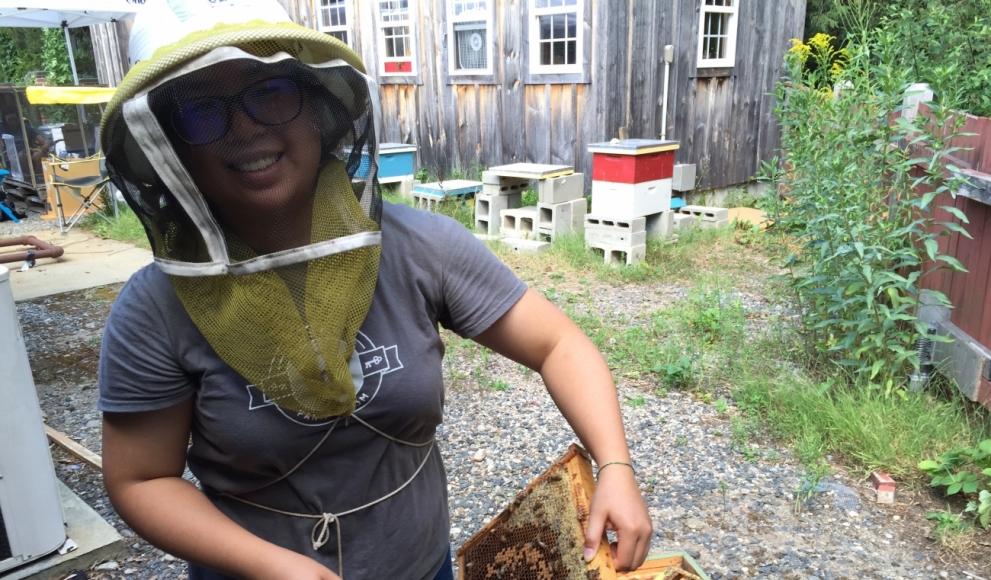Anne Shen '17 and Medeea Popescu '17 Awarded 2016 Barry Goldwater Scholarships for Outstanding Research

Anne Shen '17 and Medeea Popescu '17 have been awarded 2016 Barry Goldwater Scholarships, which provide support to outstanding undergraduate students in science, mathematics, and engineering who intend to pursue research careers in these fields. The scholarships cover the cost of tuition, fees, books, and room and board up to a maximum of $7,500 per year.
"The Goldwater recognizes students who are deeply engaged in and committed to scientific research, seeking candidates who demonstrate enormous promise as scholars and leaders in their field," said Elizabeth Mandeville '04, director of exploration and experiential learning at Wellesley. "That Wellesley has two winners this year speaks not only to the remarkable talent of these two young scientists, but also to the valuable mentorship and hands-on research experience in laboratories that Wellesley College faculty provide."
For Shen, whose parents emigrated from Taiwan when she was a child, the award is a wonderful affirmation of the bee research she has done so far and of her goal to become a scientific researcher, something no one in her family has done. "When I got the email from Liz Mandeville, I screamed out loud," said Shen, a biological sciences major. "My mother was so excited by the news that she could not concentrate that day at work."
Shen planned to major in economics at Wellesley, but signed up for a biology class her first semester. The following semester, she began working in the lab of Heather Mattila, associate professor of biological sciences, who studies honey bee behavior.
"I really like animals, and bees are so important to agriculture," said Shen, who focuses on the effects of juvenile undernourishment on adult behavior. "Each generation depends on an older generation of sisters to take care of them, but what if the bees don't have enough food one season? Can they recover? Or will the whole colony become less and less healthy over time?"
The work is challenging, she said, because there are so many variables involved and people tend to want a Band-Aid solution. "We have gotten so used to controlling the environment and choosing what we want, but there is only so much we can control with technology and genetic engineering. We have forgotten how nature works," she said.
Shen, who plans to pursue a Ph.D., said she is still smiling about the Goldwater. Mattila is also pleased. "Anne has been a really important member of my lab since her first year at Wellesley. I hope the acknowledgment of excellence that this award represents will propel her forward as she considers her career path beyond Wellesley," Mattila said. "Anne has tremendous potential to make a difference through her thoughtful approach to research. But now it’s not just me telling her that, it’s the wider world too!"
Medeea Popescu '17 researches the potassium channel hERG and its role in regulating the human heart in the Darling lab, run by Louise Darling, Knafel Assistant Professor of Natural Sciences and assistant professor of biological sciences. Popescu said she is incredibly honored to receive a Goldwater scholarship. "I've found that many, if not most, of the experiments you run will fail, and it can be frustrating to spend hours and hours going in a direction that ends up being fruitless or to repeat a procedure multiple times to get a single usable result," she said. "So being awarded a scholarship that says, essentially, 'We believe in your ability and potential, and we’d like to support the work you’re doing,' is pretty amazing."
Popescu, a biochemistry major and math minor, said she knew very little about potassium channel biology before she started working in the Darling lab two years ago. "I knew I was interested in research that had clinical applications, preferably related to human health and disease," she said. "Now I find the complexity of heartbeat generation and how much we have left to discover really fascinating."
Popescu said that doing independent research was challenging at first, but the experience helped her develop confidence in her laboratory skills and in her ability to think critically about a project.
"I was thrilled to learn that Medeea had been awarded a Goldwater Scholarship; it is incredibly well-deserved," said Darling. "One of Medeea's primary strengths as a scientist is her uncanny ability to synthesize information across disciplines and sources. She is also a strong collaborator who is clearly interested and invested in both teaching and learning from others, both her peer and her mentors."
This past year, Popescu studied at Oxford University, where she was stunned to see how few women asked questions during a talk or volunteered an opinion in class, she said. She returned to Wellesley with a greater appreciation for the academic environment here. "Wellesley encourages outspokenness and self-confidence," she said. "I really believe I could only have developed those attributes here."
Popescu, who wants to earn a Ph.D., is working in the Darling lab this summer, conducting research for her senior thesis. "I can't thank Professor Darling and the department enough," she said. "The professors I've had at Wellesley have all been, without exception, completely engaged with and invested in their students."
